Jana al-Issa | Hussam al-Mahmoud | Lujain Mourad
Seven years have passed since the most famous Resolution 2254 on Syria entered into force unanimously by the 15 member states of the UN Security Council and based on the “Geneva” and “Vienna” statements.
The 16-item decision, which was issued on 18 December 2015, set a roadmap for the political transition process in Syria, according to specific mechanisms and timing, which has not yet been implemented.
Amid the absence of any signs of a solution in Syria and the permanent link between it and the UN resolution, the door opens to questions about the obstacles to implementing the resolution and the responsibility for delaying its implementation, as all countries and the UN authorities concerned with the file consider it “the key to the solution in Syria.”
In this file, Enab Baladi explores the opinions of former diplomats, experts, and politicians about the obstacles that hinder the implementation of UN Security Council Resolution 2254 (2015) on Syria and who is responsible for that amid the emergence of the “Astana” process, which is parallel to the UN track of international negotiations on Syria.
“2254,” a useless consensus
On 18 December 2015, the foreign ministers of the member states of the Security Council, in the presence of the Secretary-General of the United Nations at the time, Ban Ki-moon, and the international envoy to Syria at the time, Staffan de Mistura, unanimously voted on a draft resolution on the “peace process in Syria,” bearing the number “2254”.
This decision was based on the principles stipulated in the “Geneva I” document, which was announced in the final statement issued by the meeting of the Action Group for Syria on 30 June 2012.
It stipulated that “the parties must recommit to a permanent cessation of armed violence in all its forms and to intensify and expand the pace and scope of the release of arbitrarily detained persons, including in particularly vulnerable groups, and persons who have participated in peaceful political activities.”
Resolution 2254 reaffirmed its strong commitment to the sovereignty, independence, unity, and territorial integrity of Syria and recalled its demand that all parties take all appropriate steps to protect civilians, including members of ethnic, religious, and confessional communities, and reiterated that the only sustainable solution to the current crisis in Syria is through an inclusive and Syrian-led political process that meets the legitimate aspirations of the Syrian people.”
The Resolution also included confidence-building measures between the conflicting parties, such as opening humanitarian corridors, allowing humanitarian organizations quick and safe access to all parts of Syria, and the release of arbitrarily detained persons, especially women and children.
It also called for all parties to stop carrying out any attacks against civilians, vital and medical facilities, and humanitarian work teams, for the internally displaced to return to their homes, to rehabilitate the affected areas, and to provide assistance to countries hosting refugees.
The decision necessitated submitting a quick report within one month of the implementation of the resolution by the United Nations to the Security Council on commitment to implementing the provisions of Resolution 2254.
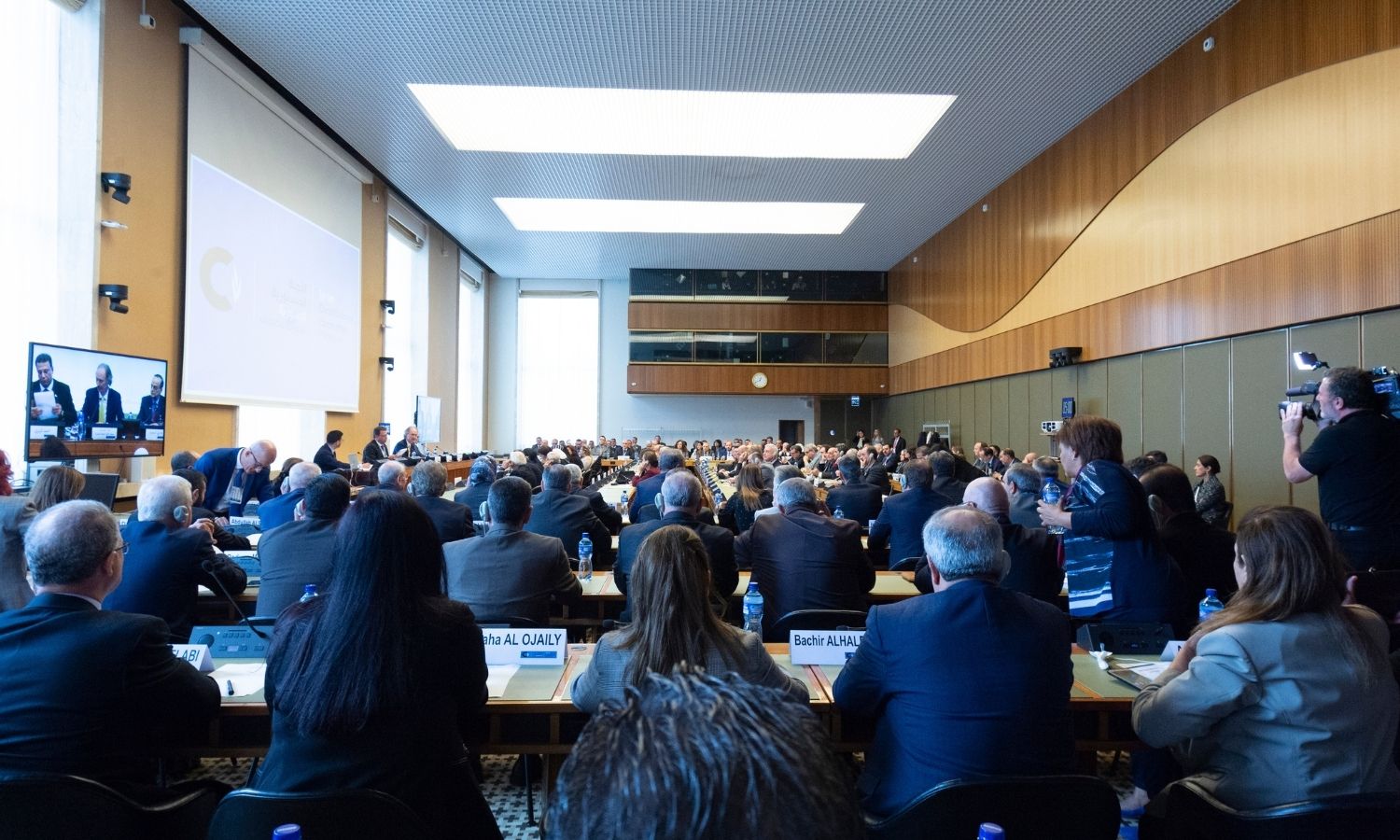
The meeting of the Syrian Constitutional Committee at the United Nations headquarters in Geneva – 31 October 2019 (UN)
“Stubborn” regime, superpowers “going along”
Since announcing approval for the implementation of the resolution, it has received several criticisms, including the absence of binding mechanisms within its provisions related to the political process or monitoring and verifying the cease-fire.
Despite these criticisms, the countries and parties concerned with the Syrian file are still sticking to its application, as the agreed reference and the framework for the current negotiation process.
The Syrian-Canadian researcher, Faisal Abbas Mohammad, told Enab Baladi that Security Council decisions usually come as a result of negotiations and bargaining among the five permanent members.
“In many cases, the greatest difficulty lies in implementing these decisions, either because of the different interpretations of them depending on the interests of the powers and parties concerned or because the party involved in the decision is endowed with the ability or support of great powers or weights, or it could be both reasons,” he added.
Mohammad, who holds a doctorate in Middle Eastern studies from Canada, believes that the examples that stand out in this context are the decisions related to Kashmir, Palestine, and Western Sahara.
Kashmir has been waiting since 1948 for the promised referendum that India has been stalling until today, and Palestine has been waiting for the establishment of the promised state and the right to self-determination since 1948 and other decisions related to this issue that Israel and its Western allies have made a dead letter, and other pending decisions until now, Mohammad said.
Regarding the decision related to Syria, Mohammad believes that “2254” has not yet entered the implementation stage because of the intransigence of the Syrian regime and its prevarication, using Russia and Iran, who realize that a political solution will lead to the demise of the regime, and this, in turn, will be a strong blow to their interests.
In addition to other reasons, the failure to start implementing Resolution 2254 is also related to the lack of seriousness of the American position, as the goals of American officials moved from changing the Syrian regime to changing its behavior, according to the academic.
For his part, the thinker and professor of contemporary political sociology at Sorbonne University, Dr. Burhan Ghalioun, told Enab Baladi that the Syrian regime does not consider that there is a fundamental problem in Syria.
“The regime’s involvement in negotiation aims to extract the ‘victory’ it achieved over the opponents, whom it sees as conspirators against it with the support of foreign countries,” says Ghalioun.
Regarding the regime’s “formal” response to the decision before the UN envoy and the concerned countries, Ghalioun believes that the regime is pretending to respond to gain time and satisfy the Russians’ guidance.
“No one accepts to concede to the conspirators (as the regime used to dub opponents) whom he defeated in the field and dispersed their families and displaced them, which shows that he is in another world that has nothing to do with what others think about the political problem or settlement and change,” says the thinker.
Enab Baladi contacted Jennifer Fanton, the spokeswoman for the press office of the UN envoy to Syria, via email to talk about the obstacles that faced the implementation of Resolution 2254 from a UN point of view without receiving an answer to these questions specifically.
Fanton contented herself with confirming what was included in the periodic statements issued by the office of the UN envoy to Syria, Geir Pedersen, about the need to work to “de-escalate, restore relative calm on the ground, renew the framework on the humanitarian front, and resume the meetings of the Constitutional Committee and make them more objective in Geneva and elsewhere.”
Unanimous support, despite the difference in position
UN resolution 2254 enjoys “public” support from all countries affecting the Syrian file, regardless of their positions on the Syrian regime, which raises questions about the position of the countries loyal to the regime in supporting a decision that works to remove it from power.
|
The countries influencing the Syrian file officially support the decision for more than one reason, including that the decision enjoys international support and consensus in general. Some parties are also reluctant to object to it so that the international community does not hold them responsible for obstructing it, as is the case with Russia and Iran. Syrian-Canadian academic Faisal Abbas Mohammad |
The language of the decision leaves room for interpretation of some of its aspects in favor of the regime, according to academic Faisal Mohammad. For example, the decision stipulates that Syria is concerned with implementing it without external interference.
This is explained by the Russians by saying that the implementation of the decision must be “under the supervision of Bashar al-Assad.” This interpretation ignores the fact that this regime headed by al-Assad is the core of the problem in the first place.
Dr. Ghalioun explained this by saying that countries of all positions declare their support for the decision “so that it is not said that they do nothing in the face of a humanitarian and environmental catastrophe that international humanitarian reports described as (the bloodiest and greatest since World War II), but they all know that it is an empty decision that will neither advance nor delay.”
Hussam al-Hafiz, head of the legal office in the Higher Committee for Negotiations for the years 2016 and 2017 and a member of the delegation to the Syrian opposition negotiations for 2014, told Enab Baladi that it is natural for the decision to be accepted by all parties, including Russia, given that the decisions issued by the Security Council rarely face rejection. It comes after understandings, agreements, and amendments between countries and leaves the door open to a state of indecisiveness. Resolution 2254 is an example of that.
The decision provides for a partial political process, that is, under the umbrella of the current government (the head of the Syrian regime), and the constitutional political process takes place under his supervision, and the outputs of the constitutional political process flow into the mechanism for producing constitutional outputs according to the mechanisms of the regime (the People’s Assembly).
This process does not lead to a political transition, but it may produce long-term reform, not a complete political transition. The regime seeks to summarize the political transition in constitutional amendments, whether through a new constitution or the current constitution, and this differs from the view of the revolutionary and opposition forces and the forces that support them in theory, according to al-Hafiz.
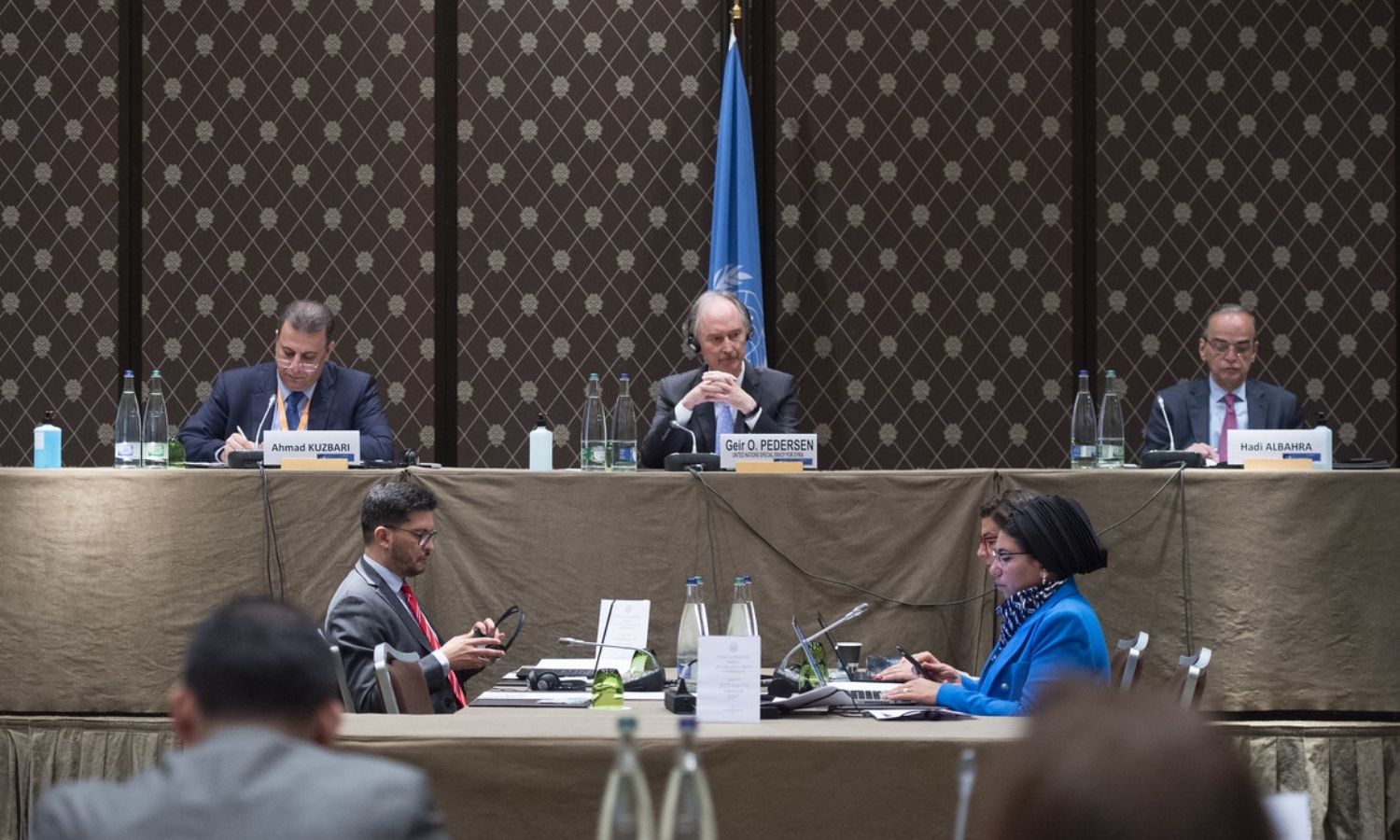
The eighth session of the Syrian Constitutional Committee meetings – 5 June 2022 (Syrian Negotiation Commission)
Who is responsible?
None of the active parties in the Syrian file have admitted that they have ignored their responsibilities in this context, given that Resolution 2254 is considered the main reference for a solution in Syria, without even starting to implement it.
Despite the obligation to implement the decisions issued by the Security Council, Resolution 2254 remained pending without becoming clear to the public the parties that should bear responsibility for this.
Russian-American complacency
Since its issuance, Resolution 2254 has not escaped American talk, which sees it as an essential step to end the conflict in Syria.
Talking about ways to implement the decision formed part of most of America’s discussions about the future of the Syrian file, without any tangible action on its part.
The situation is no different on the part of Russia, which considered the decision, since its issuance, a “basic plan in Syria,” while it continued to obstruct the political process in Syria.
The former Syrian diplomat, Bassam Barabandi, told Enab Baladi that despite the existence of a Russian-American agreement to implement the decision, the American side was not in a good mood for military intervention in Syria and did not consider Syria a strategic issue, which hindered a serious position that requires Russia to implement the decision within a period of specific time.
The American role was limited to a “huge announcement” to push for the implementation of the resolution, without a real investigation on the ground, according to what Barabandi said.
Barabandi added that the absence of American interest in this file gave Russia space for military intervention in Syria and to start blackmailing the American side to change the order of the decision according to its perceptions.
The first step of the decision shifted from a high-level position to establish a transitional government to the establishment of a constitutional committee, which Barabandi considered an indication that America had no desire to confront Russia and wanted it to drown in the “Syrian quagmire.”
In turn, Russia took advantage of the current international and regional circumstances and tried to find alternatives to the political process based on Resolution 2254.
Syrian opposition an “obstacle” to “2254”
The Syrian opposition shows its desire to implement Resolution 2254 through the doors available to it, such as its involvement in the work of the Constitutional Committee, which has not achieved anything new in the political track, despite its work for four years.
The opposition is considered one of the most prominent parties responsible for the file of political action in Syria.
Former diplomat Danny al-Baaj believes that the issuance of Resolution 2254 is a backward step and an indication of the opposition’s failure to implement the basic Geneva statement and the beginning of Russian influence in Syria.
The opposition is responsible for transferring the vision of the solution in Syria from a transitional body to a “transitional governance” after Resolution 2254, al-Baaj told Enab Baladi, likening its role in implementing the resolution to “striking the dead,” indicating that it had no significant impact.
This is consistent with Barabandi’s opinion, as he said that the opposition was weak and dispersed during the issuance of Resolution 2254 and did not represent the Syrian people, considering that this is one of the main reasons for not implementing it.
Barabandi added that the opposition has a “childish” ambition that makes it comply with the orders of states “in the hope of obtaining a share of the government in Syria,” which makes it an obstacle in implementing resolutions that serve the Syrians.
Meanwhile, the former head of the Syrian National Coalition, Khaled Khoja, told Enab Baladi that the opposition, with its disintegration, lack of harmony, and lightweight in the political equation, did not play a real role in pushing for the implementation of the resolution.
UN manages the crisis, not solving it
Four UN envoys have succeeded in managing the Syrian file since 2011, but they have not succeeded in implementing the main objective of their appointment, which is reaching a settlement or solution to the conflict in Syria.
After the many promises made by the former UN envoy, Staffan de Mistura, and then the current UN envoy, Geir Pedersen, regarding the implementation of Resolution 2254, their role was limited to recommendations following meetings with the various actors involved in the Syrian file.
Last October, Pedersen said, “Resolution 2254 has not succeeded so far,” after months of continued obstruction of the work of the Constitutional Committee without being able to provide solutions to complete its work.
Former diplomat Bassam Barabandi said that the major countries use the UN as a tool or a front to hide behind in crises that the international community does not want to solve or that the “mature” circumstance is not available to solve them.
Barabandi added that the role of the UN representatives in crises appeared to be managing the crisis and not finding a solution to it.
In response to Pedersen’s role in implementing Resolution 2254, Jennifer Fanton, spokeswoman for the press office of the UN envoy to Syria, said via email correspondence with Enab Baladi that the UN envoy continues to use any opportunity to consult with the main players in the Syrian file to support the implementation of the resolution, without mentioning further details about the mechanism and themes of these consultations.
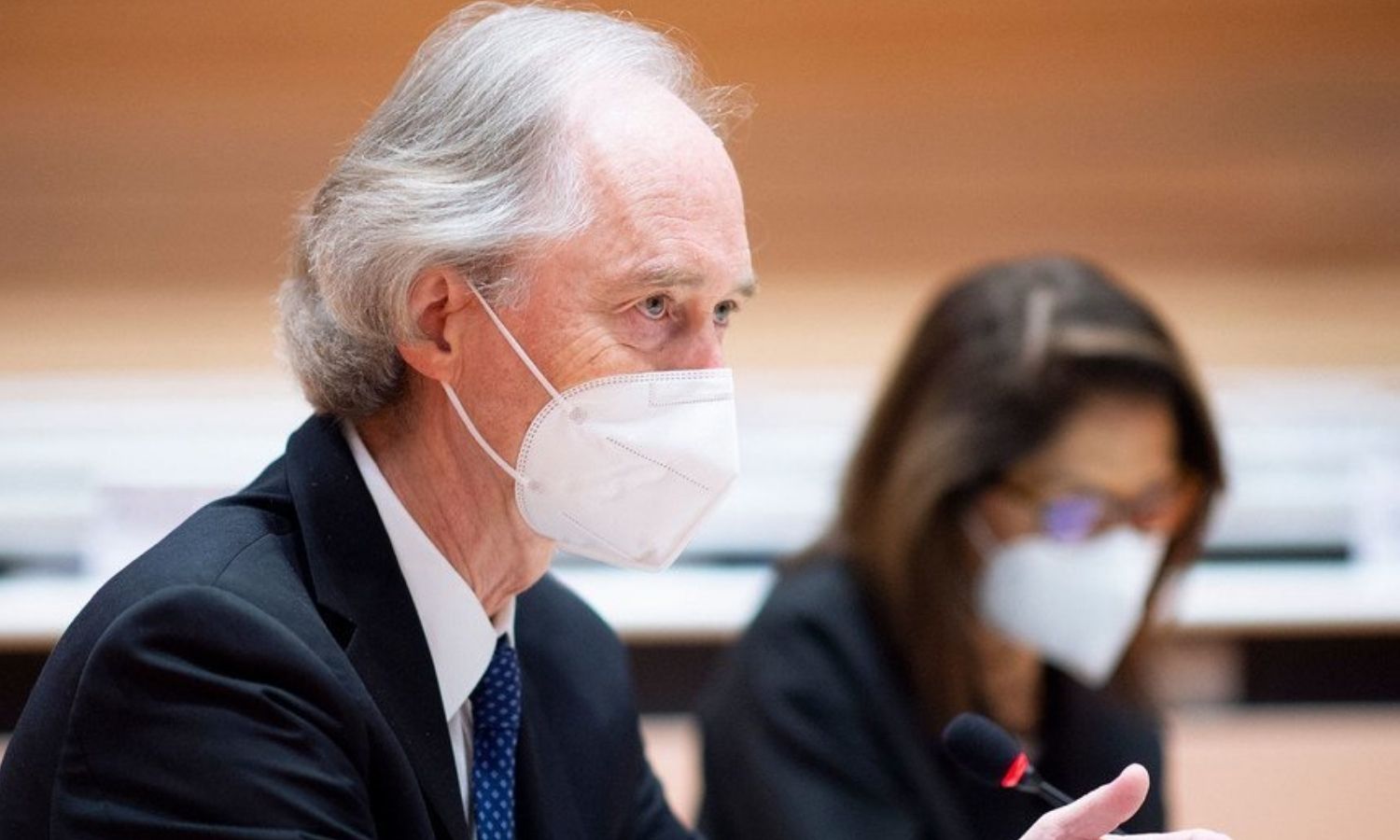
UN’s Special Envoy for Syria, Geir Pedersen, meets with the co-chairs of the Syrian Constitutional Committee in Geneva – 22 October 2021 (UN)
On Geneva “ruins”
Resolution 2254 carried in its broad title when it was issued in 2015 “the peace process in Syria,” and it explicitly stated in one of its 16 clauses the implementation of a peace plan according to political foundations that include the formation of an inclusive transitional governing body within six months.
The months set by the Council did not result in anything, as the decision remained confined to the corridors of the United Nations and the statements of officials of the countries concerned with the Syrian file.
The UN resolution did not prove its presence on the ground at the level of other provisions either, such as a permanent cease-fire, at a time when Syria was the scene of military operations launched by the regime, and siege operations to subdue the rebellious cities, villages, and towns.
In light of these facts, the Astana peace process emerged, whose first rounds began in January 2017, after the signing of a cease-fire agreement between the Syrian regime and the opposition in the Turkish capital, Ankara, in December 2016. Turkey justified this agreement at the time by the need to provide a safe exit for the opposition from the besieged areas.
Since that time, the Astana rounds have continued continuously, with partial stops, before the 19th round was held on the 23rd of last November in the Kazakh capital, Nur-Sultan.
The process that came on the “ruins” of Resolution 2254 without officially torpedoing it narrowed the dialogue circle and reduced it to representatives of the guarantor countries of the track (Turkey, Russia, and Iran), one delegation for the opposition and another for the regime, the UN envoy to Syria, and delegations from Jordan, Iraq, and Lebanon participating as observers, and representatives of international organizations.
Dr. Hussam al-Hafiz, head of the legal office in the Higher Committee for Negotiations for the years 2016 and 2017 and a member of the Syrian opposition negotiation delegation for 2014, explained that the Astana track did not appear based on a UN resolution, but at the same time, it is the result of a partial international consensus, given that it belongs to the guarantor countries of the Syrian file for the sake of discussion between them and other countries with regard to Syria, politically or militarily.
Al-Hafiz added to Enab Baladi that there are no roles for the regime and the opposition according to this path and the rounds that carry it except through mediators and guarantors, and each of the guarantor countries has its own interpretation of the Astana path.
The UN sees the decisions from its angle, and Moscow looks at “Astana” as a military path in the first place, then a political one, especially after it merged the cease-fire with settlements with different conditions and all related technical issues issued by it, such as defining contact lines and conducting joint patrols, which reflects its desire in using “Astana” as a path for a political solution away from Geneva.
On the other hand, Turkey does not adopt the same approach, as it wants to support the Geneva process, which constitutes the summary of UN Resolutions “2118” and “2254”, but it also responded to Russian pressure when the military action caused the displacement of civilians from Aleppo, and the regime regained what it lost from the city in December 2016.
According to al-Hafiz, the Iranians also did not show a desire to mix the Astana track with the political process, as they are not part of the international group that produced the decisions within the Geneva track, nor are they participating in the negotiations that preceded “Astana” and “Geneva,” which took place in 2014. However, Ankara and Moscow wanted Tehran to be strongly present in the Astana process, as it is present on the ground and a main supporter of the regime.
|
The Geneva talks cannot be abandoned in favor of the Astana process because that contradicts the interest of the revolution and the opposition. What gives hope for a political solution is the “Geneva” format, not the “Astana” one, in which the opposition does not have any tools, even the military, that is supposed to form the basis of the process. Member of the Syrian opposition negotiation delegation for the year 2014, Hussam al-Hafiz |
The final statements issued by the parties of the Astana process are very similar and range from stressing Syria’s sovereignty and combating terrorism, to a peaceful solution to the conflict in Syria, to the “voluntary” return of Syrian refugees, and concern about the deteriorating humanitarian situation in different areas of control.
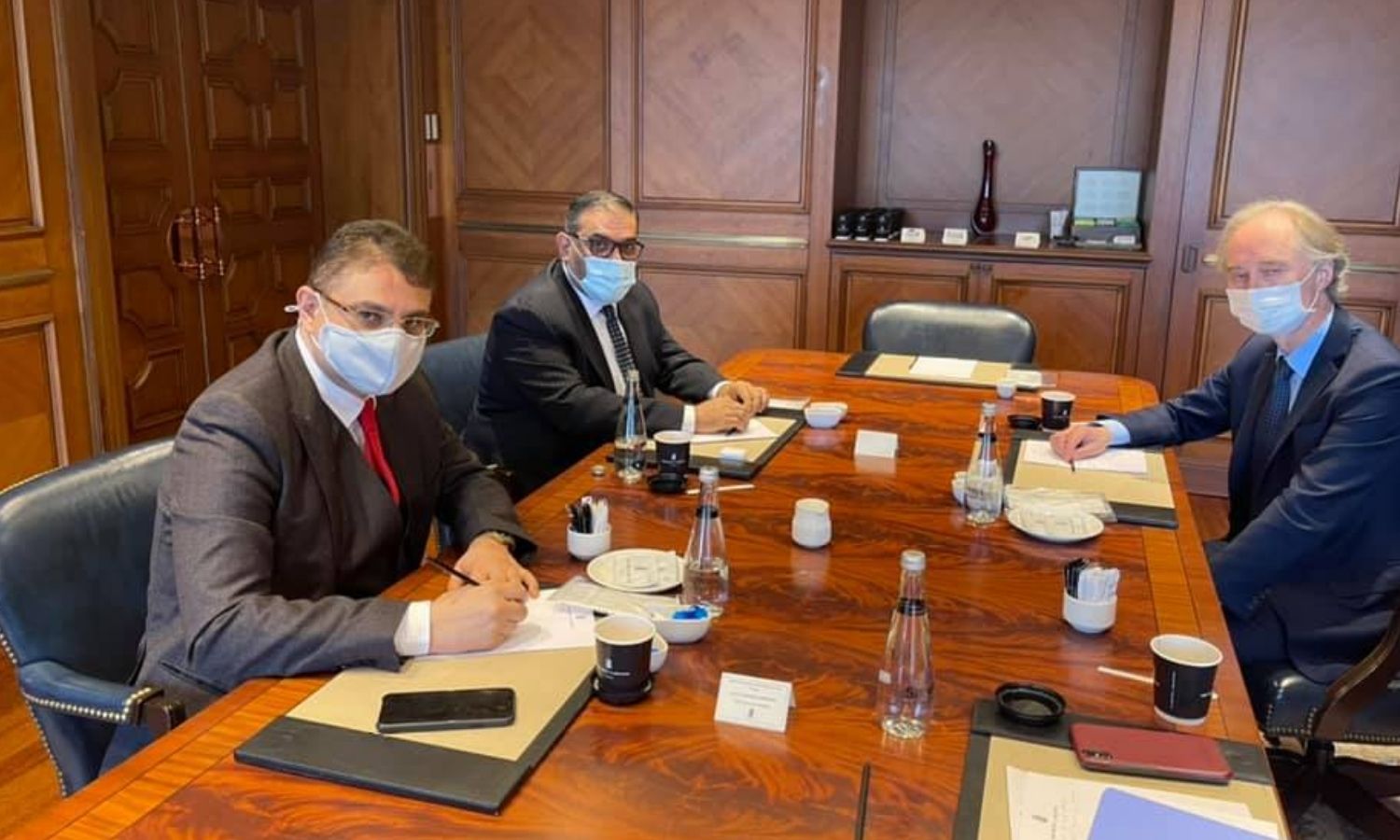
Anas al-Abdah, head of the Syrian Negotiations Committee, during his meeting with the UN envoy, Geir Pedersen, to discuss ways to activate Resolution 2254 – 2 March 2021 (Syrian National Coalition)
To where with the pending decision?
Without any looming signs, questions are being raised about the future of the resolution, as it is still being portrayed as “the key to the only solution to ending the conflict in Syria,” especially after seven years have passed since Resolution 2254 was issued, and it did not introduce anything new in the Syrian file.
Former Syrian diplomat Danny al-Baaj told Enab Baladi that this is not the first resolution issued by the Security Council and that it takes a long time to implement it because it is under Chapter VI, which means that there are no tools to force the international community to implement it.
The former head of the Syrian National Coalition, Khaled Khoja, believes that the decision has served regional and international agendas more than it serves the opposition and the Syrian people.
Khoja explained that the Syrian regime, which enjoys Russian support and is able to make the resolution lose its effectiveness, has refrained since the issuance of the resolution from cooperating with any tracks for its implementation.
While the former diplomat, Bassam Barabandi, said that the future of the decision lies in its remaining map of the solution in Syria, pointing out that this does not necessarily mean that it will be implemented soon.
Academic Faisal Abbas believes that despite the loopholes contained in Resolution 2254, it is still able to put Syria at the beginning of a political solution, pointing out that this requires a decline in Russian-Iranian support for the Syrian regime.
Better option, not solution
There are two theories regarding the fate of Resolution 2254, one of which considers it a thing of the past and everything that is currently happening as an excuse for it but outside its framework, and the second believes that the resolution was not hoped to be achieved except through the political consensus produced by the Russian-US consensus at a historical moment in time.
Consequently, the decision has lost all elements of pressure today, whether political or legal, which denies that it is a vehicle for real transformation in the Syrian file.
This requires either a new Security Council resolution, which is very unlikely, or creating changes in the internal and external political scene that lead to a political process in new ways, according to what Hussam al-Hafiz explained.
The member of the Syrian opposition negotiating delegation for 2014 ruled out that “2254” would constitute a solution to the Syrian file, even if it was fully implemented.
Noting that the implementation of UN and Security Council resolutions is a gain for the Syrian people who seek political transformation, and these resolutions, including (2254), contain some of these demands, but the lack of international will and clear implementation mechanisms put them on the shelf.
According to al-Hafiz, the solution requires the establishment of a national state that is capable of change (both the regime and the opposition), whether under an international umbrella or under the umbrella of broader political settlements.
However, the opposition here is unable to turn the tide in this direction due to the weakness of the political structures of the revolutionary and opposition forces, he concluded.
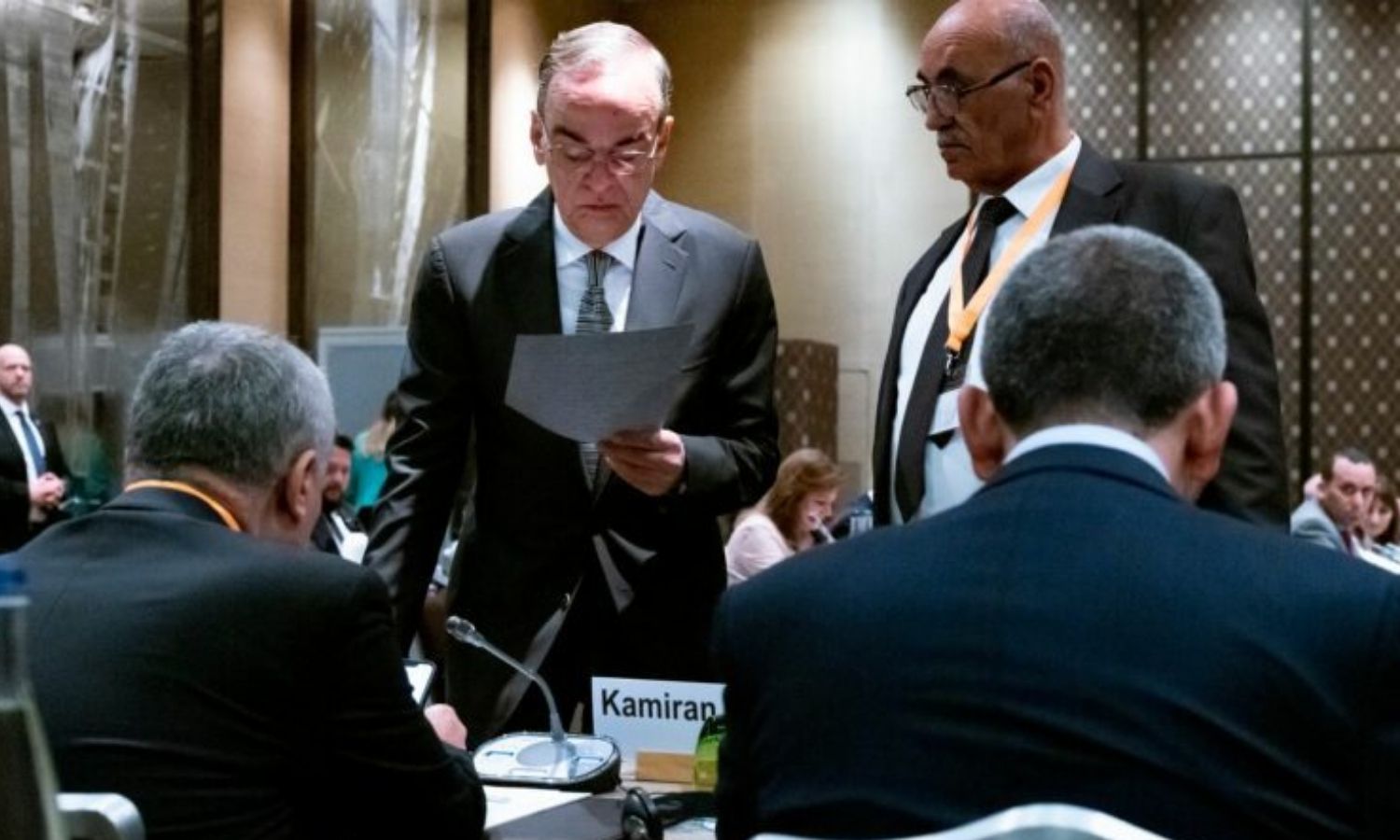
The eighth session of the Constitutional Committee meetings – 5 June 2022 (Syrian Negotiation Commission)
“Influence cards” not in Syrian hands
Former diplomat Danny al-Baaj said that the decision is no longer Syrian after the opposition lost its ability to influence, and its role was limited to “subordination” to other parties.
On the other hand, the regime has lost part of its ability to influence, despite its ability to maneuver between two allies due to the conditions that Iran and Russia are going through, according to al-Baaj.
|
The “cards of influence” on the Syrian track are out of the hands of the Syrians. Neither the opposition nor the regime can influence this file. Former diplomat Danny al-Baaj |
The Syrian file is awaiting an international agreement, but in light of Russia’s submergence in Ukraine at the present time, it is not in the interest of Western countries to move the file forward, al-Baaj added.
He believes that solutions from the main regional or international players are unlikely, considering that the current time for the Syrians is limited to watching and waiting for the results of the popular movement in Iran and the Russian-Ukrainian war.
This could be reflected in the Syrian file, especially in light of the existence of the Syrian regime in a suffocating economic crisis that it will not be able to overcome without rescue steps from its most prominent allies.
Due to its weakness and financial collapse, the regime may be forced to change its policy of dealing with international decisions, which seems too expensive for it and its allies, according to academic Faisal Mohammad.
Mohammad expected that the Syrian file in 2023 would witness surprises in this context due to the troubles that Russia is experiencing in the Ukrainian quagmire, in addition to the political-economic crisis facing Iran.
On the other hand, Burhan Ghalioun, a doctor at the French Sorbonne University and former president of the Syrian National Council told Enab Baladi that the only way out is not waiting for a solution from outside in general.
Ghalioun believes that none of the international, regional, and local forces involved in the Syrian conflict have an interest in reaching a solution, pointing out that if the solution does not come from the Syrians themselves, then it will never come.
“New blood” to move on
Former diplomat Bassam Barabandi said that the solution from the Syrian side is for the “coalition” to hold real, transparent elections away from “useless” internal laws.
The opposition needs “new blood” to be part of the solution instead of being part of the problem over the past years, according to Barabandi.
Al-Baaj also believes that the move could be from outside the opposition towards activating the opposition’s role by pushing for a change in the composition of the National Coalition and expanding the concept of political forces to engage in negotiations.
Civil society can also play an important role in providing solutions alongside political forces that are not subject to external pressures, al-Baaj concluded.
if you think the article contain wrong information or you have additional details Send Correction
النسخة العربية من المقال
-
Follow us :
Most viewed
- Turkey moves to deploy air defense system in Syria
- Intentions for popular resistance amid Israeli escalation in southern Syria
- SDF to withdraw from Aleppo neighborhoods following agreement with Damascus
- Washington's conditions raise questions about its openness and goals in Syria
- Syrian returnees celebrate first Eid after liberation












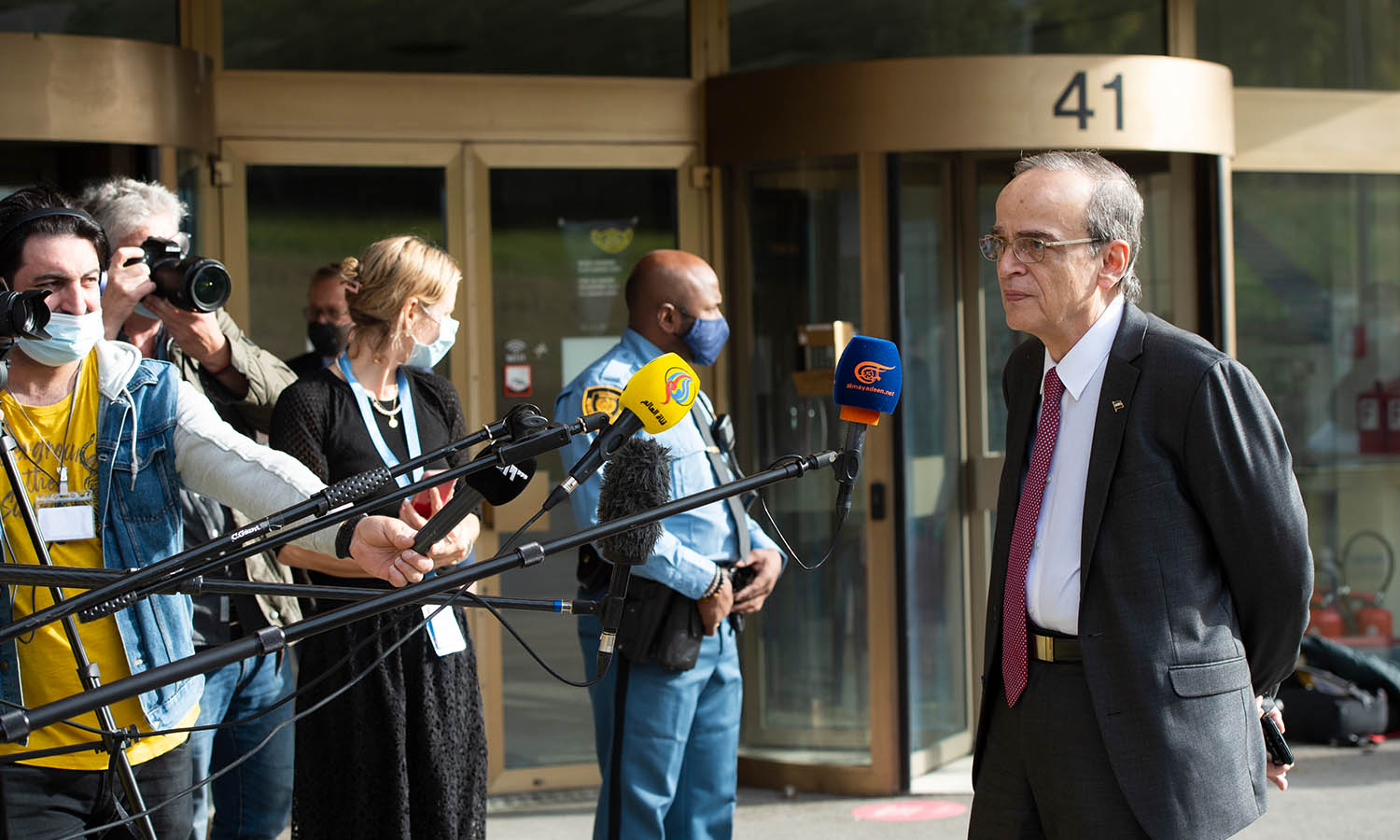
 The co-chair of the Syrian Constitutional Committee, Hadi al-Bahra, speaking to journalists in front of the United Nations headquarters in Geneva - 18 October 2021 (UN)
The co-chair of the Syrian Constitutional Committee, Hadi al-Bahra, speaking to journalists in front of the United Nations headquarters in Geneva - 18 October 2021 (UN)





 A
A
A
A
A
A
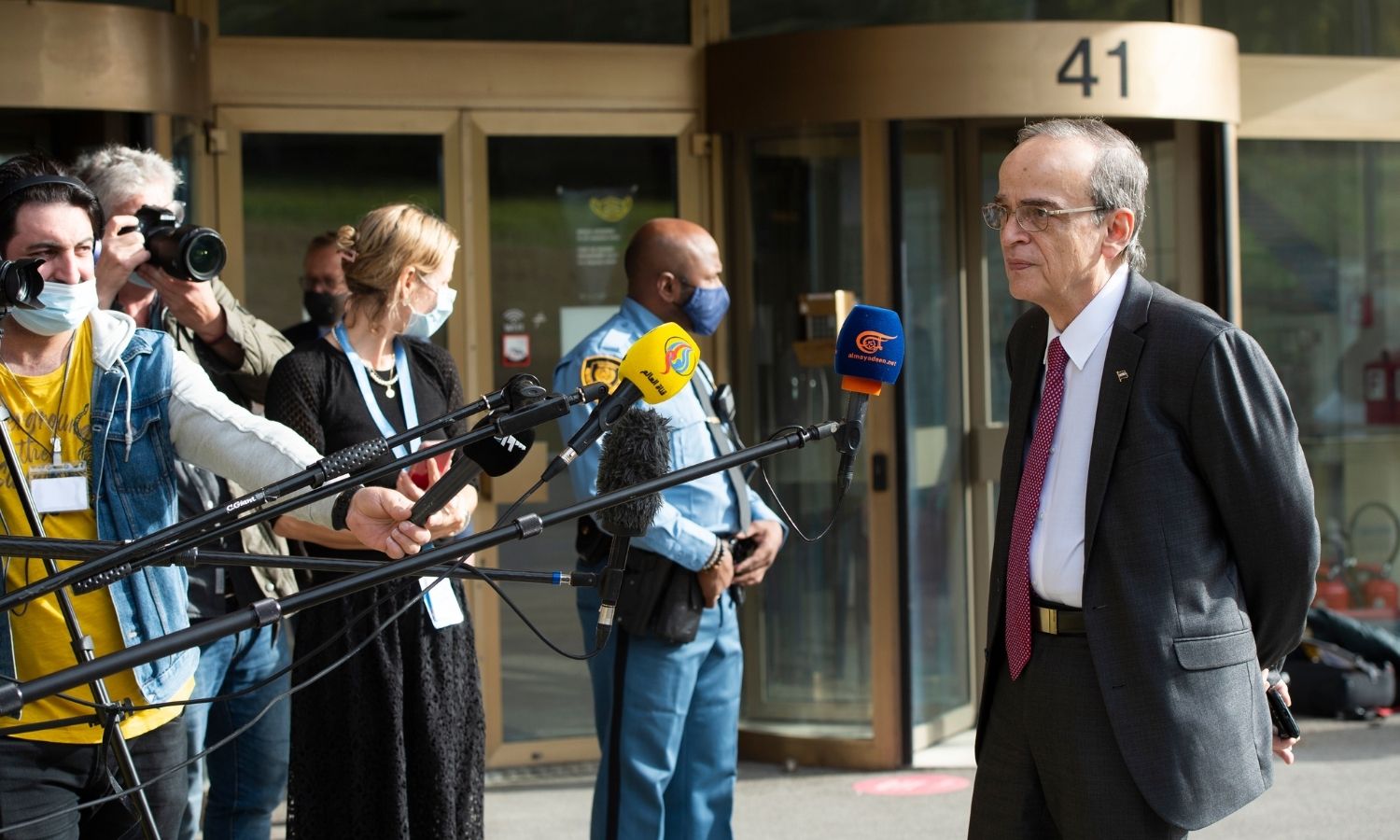







 More In-Depth
More In-Depth